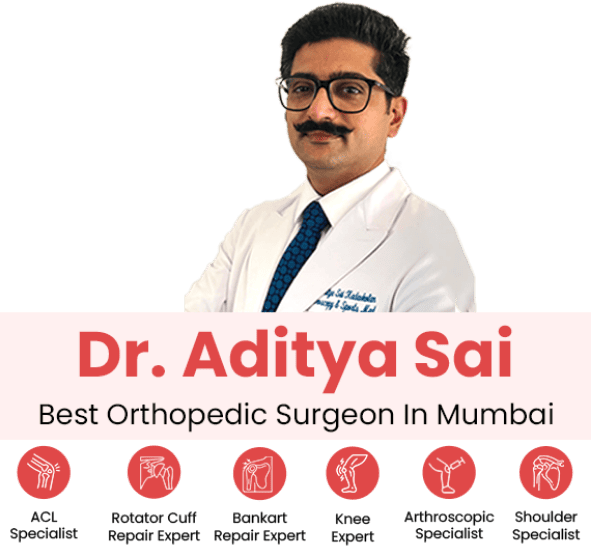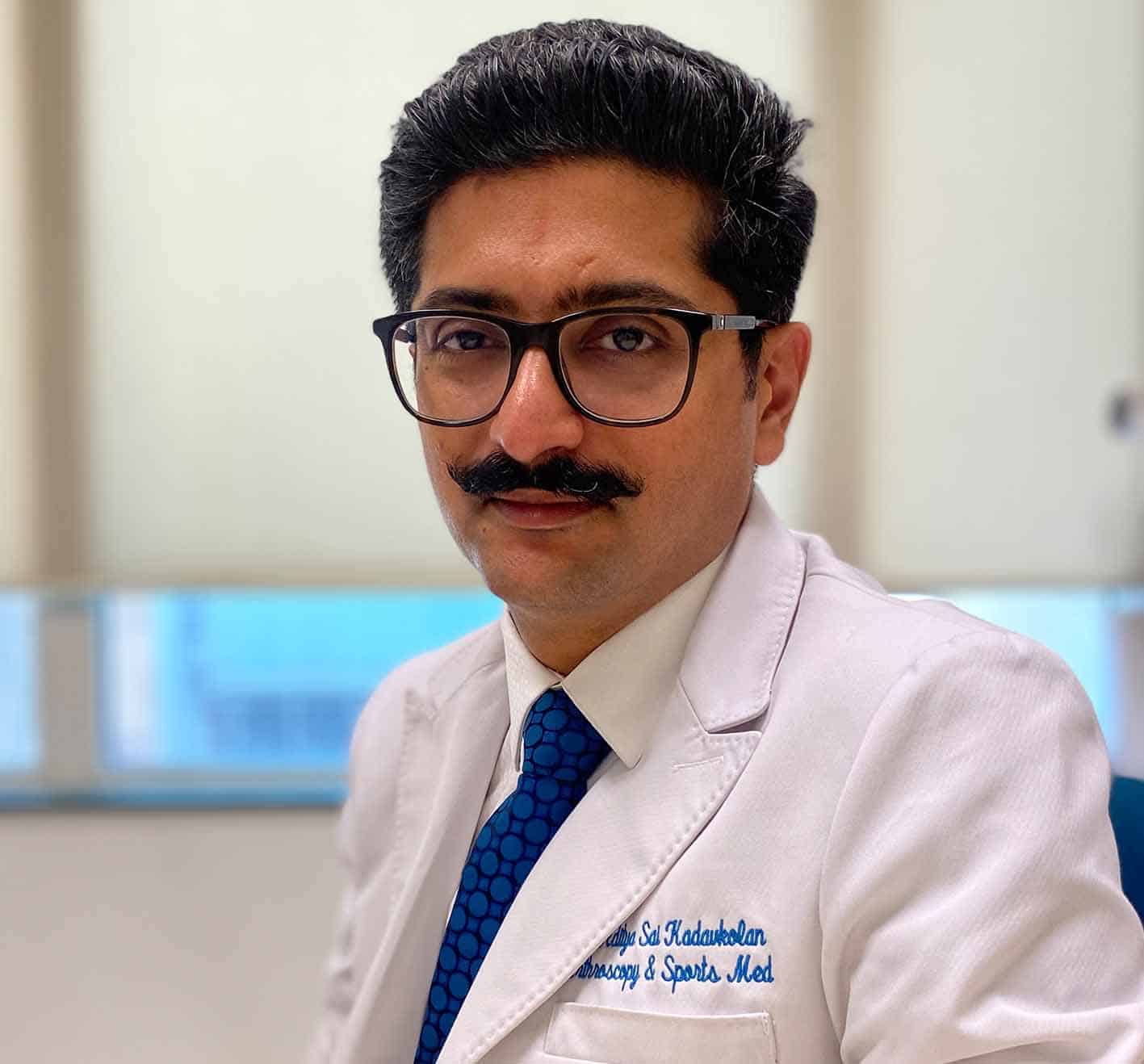
Knee Treatment At The Best Hospital In India
Dr. Aditya Sai
MS, DNB (Orthopaedics)
Why Choose Dr. Aditya Sai?
- 15+ Years Of Experience
- 15,000+ Patients Treated
- 3,000+ Procedures Performed
Meet Our Doctor
Consultant Orthopedic Surgeon
Dr. Aditya Sai
MS, DNB (Orthopaedics)
Dr. Aditya Sai is a consultant in Orthopaedics specializing in Shoulder Surgery, Knee and Hip arthroscopy & Joint preservation Dr. Aditya has been trained in the best of the institutes in India as well as globally, with his MBBS from the Madras Medical College and MS in Orthopedics from Seth GS Medical College & KEM hospital, both amongst the top institutes in the country. He has undergone training in Hip arthroscopy and Joint preservation from the USA.

To Book Appointment Call
Testimonials
What Patients Say About Dr. Aditya Sai
 Meenal Adesh17/09/2024Very comfortable and customer service oriented
Meenal Adesh17/09/2024Very comfortable and customer service oriented RAJENDER KOHLI17/09/2024The food was surprisingly delicious and nutritious! A pleasant surprise during my hospital stay. "
RAJENDER KOHLI17/09/2024The food was surprisingly delicious and nutritious! A pleasant surprise during my hospital stay. " Vishal Singh17/09/2024I appreciate the regular updates and communication from the medicine team. Kept me informed and calm.
Vishal Singh17/09/2024I appreciate the regular updates and communication from the medicine team. Kept me informed and calm. rahul kashyap17/09/2024Tbos hospital truly cares about its patients. Felt seen heatd and valued thank you
rahul kashyap17/09/2024Tbos hospital truly cares about its patients. Felt seen heatd and valued thank you Janak Chauhan17/09/2024All doctor re very experienced and especially dermtatology
Janak Chauhan17/09/2024All doctor re very experienced and especially dermtatology JYOTSNA MISHRA17/09/2024We came for endoscopy , the staff and doctors were very professional and efficient Thank you for helping us through
JYOTSNA MISHRA17/09/2024We came for endoscopy , the staff and doctors were very professional and efficient Thank you for helping us through Ravi Chandila17/09/2024The doctors and nurses were knowledgeable, attentive, and took the time to explain everything clearly
Ravi Chandila17/09/2024The doctors and nurses were knowledgeable, attentive, and took the time to explain everything clearly Upendra Raj bhar16/09/2024Best Hospital
Upendra Raj bhar16/09/2024Best Hospital Dharmendar Kumar16/09/2024best staff
Dharmendar Kumar16/09/2024best staff
Why Choose Us?
Dr. Aditya Sai is a renowned surgical orthopedic doctor practising in Mumbai. He has 15+ years of experience, with 10+ years of specialization in Shoulder Surgery, Knee & Hip Arthroscopy And Joint Preservation.
15,000+
Patients Treated
15+ Years
Years of Experience
3,000+
Procedures Performed
Types Of Treatments Offered By Dr. Aditya Sai
Dr. Aditya specializes in problems of shoulder, hip and knee. These are the following types of treatments that the doctor provides.
Shoulder Treatment
- Posterior Instability
- Frozen Shoulder/Stiff Shoulder
- SLAP (Superior Labrum Anterior To Posterior) Tears
- Bicep Tendon Disorders
- Fractures Around The Shoulder
- Recurrent Dislocation Of The Shoulder
- Massive Rotator Cuff Tears And Superior Capsular Reconstruction
- Acromioclavicular Joint Injuries/ Shoulder Seperation
- Rotator Cuff Tears And Rotator Cuff Repair
Knee Treatment
- Cartilage Injuries
- Anterior Cruciate Ligament (ACL) Reconstruction And Repair
- Fractures Of The Knee Joint
- Knee Joint Preservation Surgery Including High Tibial Osteotomy
- Meniscus Injuries
- Multiligament Injury Of The Knee
- Posterior Cruciate Ligament (PCL) Reconstruction And Repair
- Cartilage Injuries & Treatment
- Joint Preservation Surgery Including High Tibial Osteotomy
- Meniscus Preservation & Meniscus Repair
Frequently Asked Questions
Interestingly, the knee is one of the body parts which gets injured most commonly. Knee injuries result from external twisting or bending force which is applied in a manner that the knee is not designed for anatomically. Sports or falls can cause a direct blow which results in a knee injury as well. Ligaments and cartilage can get damaged due to a knee injury.
Multiple parts of the knee can get disrupted in high force injuries sustained during activities related to sports or motor vehicle accidents. The causes for bursitis include arthritis, degenerative joint disease, infection, injuries from kneeling, overuse or gout.
Many structures come together to form our knees, and any of them can get injured. Fractures around the knee, sprains and tears of soft tissues and dislocation are common types of knee injuries. In most cases, more than one structure in the knee is injured. The noticeable signs that indicate a knee injury are a pain and swelling. The knee may lock up, or you might experience instability which feels like your knee is giving up.
Most commonly seen knee injuries include-
- ACL injuries
- Collateral Ligament injuries
- Dislocation
- Fractures
- Meniscal tears
- PCL injuries
- Tendon tears
The shoulder and knee clinic is one of the best knee treatment hospitals in India. Dr Aditya Sai is a very experienced doctor you can consider visiting if you suffer from any knee problems.
According to the cause of the injury, the location and pain intensity will differ. Signs that may be visible include-
- Weakness or instability
- Popping and crunching noises
- Redness and warmth to touch
- Swelling and stiffness
- Unable to straighten the knee fully
You might need to seek your doctors help if-
- Have marked knee swelling
- You are unable to flex or extend the knee
- Deformity in the leg or knee
- Weight is not bearable, feeling of instability or giving out of the knee
- Have severe knee pain related to an injury
- Fever along with redness, pain and swelling of the knee
It would be best if you considered visiting the doctor or surgeon who works at the best knee hospital in India because they will probably have more experience in knee surgery. Also, they are updated with all the latest techniques used for knee-related problems.
Factors that can increase the risk of knee problems are as follows-
- Certain occupations or sports
There is a category of sports that puts more pressure on your knees. Like in Alpine skiing, rigid ski boots are used, and there is a possibility of falling, basketball’s jumps and pivots and repeated pounding of knees while running or jogging. Jobs like farming and construction that put continuous stress on your knees are also risk factors. - Excess weight
Being overweight puts increased stress on your knees even while doing regular activities like walking or climbing the stairs. There is also an increased risk of osteoarthritis as a breakdown of joint cartilage is accelerated. - Lack of muscle flexibility or strength
Strong muscles help stabilize and protect the joints, while flexibility can help you get a full range of motion. In the absence of these both, there is an increased risk of knee injuries. - Previous injury
Having a previous injury to the knee makes it prone to knee injuries in future as well.
When consulting a knee surgery hospital in India, talk in detail about the concerns that worry you and discuss vulnerability to knee injuries in the future. They can suggest some exercises and precautions to help avoid the injuries.
The cause of your knee injury will decide what treatment is required.
Medication
Your doctor might prescribe pain relief medication or medicines to treat conditions like gout or rheumatoid arthritis.
Therapy
Some conditions require strengthening of knee muscles to make them stable. Your doctor might recommend physical therapy or particular strengthening exercises to treat your specific condition.
If you are an athlete or sports player, then you might need to practice the correct movement pattern if you are going wrong somewhere. It will establish a good technique for sport or activity. You can practice flexibility and balance exercises as well.
You can shift pressure from the side of the knee that is affected to the other by using arch supports and wedges on one side of the heel. Different types of braces might be used to support your knee joints based on your condition.
Injections
Your doctor might suggest a direct injection of medications into your joint in some conditions like-
- Hyaluronic acid
It is injected into your knee to improve mobility and relieve the pain. Hyaluronic acid is a thick fluid similar to the fluid that lubricates a joint. The researchers about the effectiveness have mixed opinions, but the relief from one or series of shots can last up to six months. - Corticosteroids
Corticosteroid injections help reduce the symptoms of an arthritis flare and ease the pain for at least a few months. The treatment is not effective in all cases. - Platelet-rich plasma (PRP)
PRP increases the concentration of different growth factors that reduce inflammation and promote healing. PRP also benefits people with osteoarthritis, but there are not enough studies.
Surgery
Certain conditions of the knee may require surgery but not on an immediate basis. Before finalizing anything, weigh both pros and cons of non-surgical and surgical alternatives properly. Surgical options include-
- Total knee replacement
Your surgeon will remove the damaged bone and cartilage from your shinbone, kneecap and thighbone. They will replace it with artificial joints like alloys and polymers. - Partial knee replacement surgery
In this procedure, your surgeon will replace only the most damaged part of your knee with artificial parts. Small incisions are used, so the recovery is faster than the total replacement. - Osteotomy
The surgery will include removing the bone from the thigh bone and shinbone so that the knee can be better aligned and relieve the arthritis pain. - Arthroscopic Surgery
Arthroscopy involves the insertion of a long thin tube that has a camera. If your condition is treatable using arthroscopy, then your doctor will recommend the procedure. Small incisions are used to remove or repair damaged cartilages or remove loose bodies from your knee joint and even reconstruct ligaments.
Dr Aditya Sai, who practices at the Shoulder and Knee Clinic, is well experienced in arthroscopy. If you want a doctor who can guide you to the appropriate treatment path, then the Shoulder and Knee clinic is an excellent option. It is amongst the best knee surgery hospitals in India.
Usually, knee-related procedures are treated by orthopaedic surgeons. The surgeon should have years of training to become a board-certified orthopaedic surgeon, but there is no unique qualification to become a knee specialist. You can increase the effectiveness of knee surgery and reduce the probability of complications by choosing a certified and experienced surgeon working at a hospital that has reasonable rates of success in knee surgery.
You can look at the following before choosing the surgeon-
- Check their educational qualification
It will help you decide if you check the following requirements before visiting the surgeon for an appointment- - Reviews
- Education qualification
- Training
The data will help you understand how experienced your surgeon is. - Check their experience
A good record is shown by surgeons who head at least 12 knee surgeries per year is what is seen in studies. The best surgeons are those who regularly perform the surgery by using various techniques and methods. Similarly, clinics that perform 25 TKRs a year have the best records in the field.
The hospital that you choose for your surgery should have a world-class foundation with national and worldwide accreditation and certification. Profoundly modern and cutting edge innovation is present in the clinics, which utilizes the obtrusive systems to help lessen the pain and blood loss, quicken the recovery and decrease the risk of infections.
Dr Aditya Sai is an educated and well trained board-certified doctor who works at the Shoulder and Knee Clinic. You can even visit him for a consultation appointment before to get his opinion.
To Book Appointment Call
